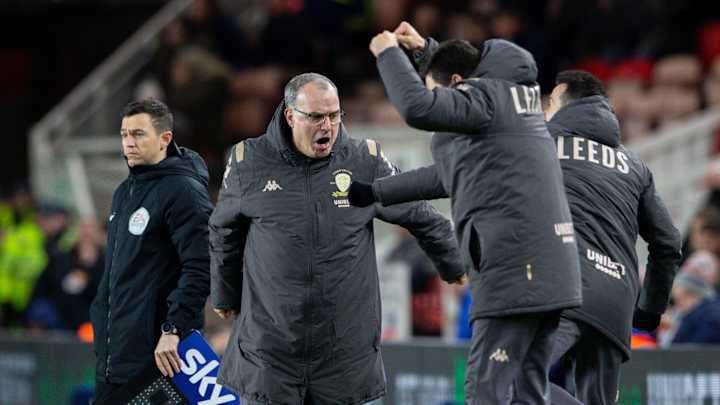Premier League Beware: Leeds United and Marcelo Bielsa Are Coming Your Way

Huddersfield is about 20 miles southwest of Leeds. There’s not normally much love lost between the clubs, but on Friday, Huddersfield Town was the toast of its grander neighbors having secured the 2-1 win over West Bromwich Albion that made sure of Leeds’s promotion to the Premier League after a 16-year absence. Leeds, no doubt, would rather have wrapped up its return to the top flight in front of a packed Elland Road, but at least it was achieved in West Yorkshire.
And, frankly, Leeds will not care. It is back. And it is back with a genuinely exciting team under one of the world’s great managers. Usually teams come up to the Premier League with a sense of trepidation, but Marcelo Bielsa is a manager who can make a team dream. After all the near misses, both for him and for Leeds, the job is done and Leeds can approach the new season with excitement.
When Leeds lost to Cardiff in its first game after the restart, the fear must have been that it was happening again. This is Leeds, and dashing hope is what it does. Leeds had won five in a row before lockdown, had built up a six-point cushion over third place. It seemed entirely typical of the club’s image that not playing, dwelling on what it might be about to achieve, should lead to collapse.
Even the Cardiff game felt typical of Leeds under Bielsa. It hadn’t played badly, but it hadn’t scored–which is why center forward Patrick Bamford has become such a contentious figure. Bielsa likes him for his work rate and movement, but he is not a natural finisher, the result of which is a sense that Leeds doesn’t fully take advantage of the domination it habitually enjoys. That was what had happened last season when Leeds blew a commanding position. Memories of the home defeat to Wigan, when Leeds had been 1-0 up and a man up and somehow lost continue to haunt the club.
But this time Leeds didn’t collapse. Given the anxiety expressed on social media as it scraped to a 1-0 win over Barnsley on Thursday, it may actually have benefited from playing behind closed doors, and not having a neurotic Elland Road crowd adding to its nerves. Leeds has won five of its last six games, including a 5-0 demolition of Stoke that included four second-half goals of extraordinary quality, each in its own way showcasing the Bielsa philosophy of pressing and dragging opponents out of position with intelligent movement of the ball. It’s the sort of football that has won Leeds–and Bielsa–friends far beyond West Yorkshire. There’s a sense it belongs in the Premier League.
And Leeds belongs in the Premier League. It’s a club with a slightly strange history, hugely successful, if unpopular for its cynicism, under Don Revie in the 1960s and early 70s–even if it didn’t perhaps win quite as much as it should have. The Dirty Leeds reputation never went away, and Leeds wasn’t much lamented when it fell into the second flight before returning to win the final league title before the coming of the Premier League under Howard Wilkinson in 1992–still the last time an English manager won the title.
After falling away again, not least because Eric Cantona was sold to Manchester United, came a surge up the table with a bright young squad under David O’Leary and a Champions League semifinal. But it was a rise predicated on overspending, and the reckoning when it came was brutal. Leeds was relegated in 2004 and, despite being the only club in a city of 750,000 population (as ever with such things, it depends exactly where boundaries are drawn, but Leeds is by some definitions the third-biggest city in Britain after London and Birmingham and, with Bradford, part of the fourth-biggest "urban area" after London, Manchester and Birmingham-Wolverhampton), it hasn’t been back in the Premier League since and has spent three seasons in the third tier.
That 16-year absence has been a tale of questionable owners, debilitating politicking, and an impossible turnover of managers. That’s why Bielsa’s tenure has been so remarkable. He may be eccentric, but he also has an obvious and inherent decency. He lives in Wetherby, a small town just outside Leeds–he maintains he hasn’t yet had time to visit Leeds itself–and is regularly seen in local shops and an Italian restaurant. Prematch research is often done in a local café. There is a humility and an ordinariness to him that chimes perfectly with the local self-image–and yet at its best the football his side produces is glorious.
Hero #lufc pic.twitter.com/PYZQFZEwpq
— Gareth Boyes (@Gareth_Boyes) July 17, 2020
Whether it will work in the Premier League is another issue, but a narrow defeat in an FA Cup tie against Arsenal showed how organization, pace and intensity, even among fairly limited players, can unsettle the elite. Of course, it’s one thing to perform well in one game–or half of one game–and another to sustain it over a full season. But Bielsa has a history throughout his career of, at least in the short term, making uncelebrated players competitive. And the physical demands on his players may not be as great as they have been in the Championship, where there is eight additional league games.
But these are details. All that matters for now is that Leeds is up and next season, Bielsa in the Premier League, should be fun.

An accomplished author of multiple books, Jonathan Wilson is one of the world’s preeminent minds on soccer tactics and history.